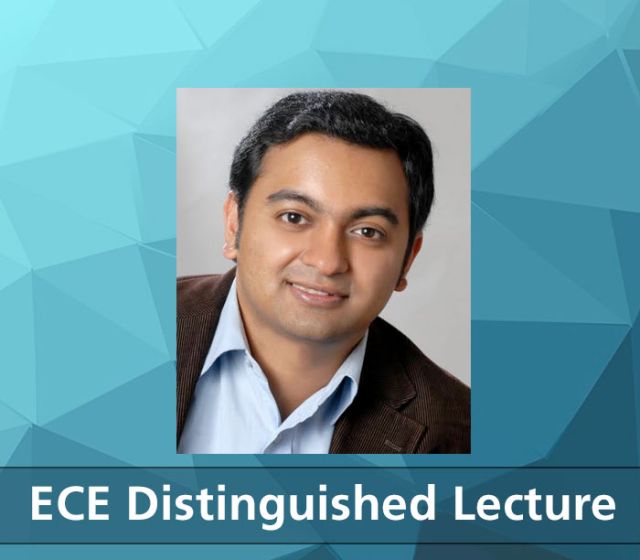ECE Seminar Series – Apr 28 (Fri) @2:00pm: "CMOS+X: Integrated Ferroelectric Devices for Energy Efficient Electronics," Sayeef Salahuddin, TSMC Distinguished Prof., UC Berkeley

Come at 1:30p for Cookies, Coffee and Conversation!
DISTINGUISHED LECTURE at the ECE SEMINAR SERIES
Abstract
Despite ominous foretelling of a slowdown, over the last decade the computational throughput has increased by orders of magnitude. Energy efficiency is critical not only to maintain this incessant advancement, but also to ensure that electronics does not become a drag on the finite energy resources of the world. This will need a radical rethinking of the basic building blocks that constitute the electronic hardware. In this talk, I shall briefly present how integrated ferroelectric devices offer a new pathway in this context. First, I shall discuss the phenomenon of negative capacitance in ferroelectric materials. A fundamentally new state in the ferroelectrics, negative capacitance promises to reduce power consumption in electronic devices significantly. I shall discuss our current understanding of negative capacitance derived from numerous experimental works done over the last few years. We shall further discuss the material science that is enabling the integration of negative capacitance into advanced transistors. Going beyond transistors, the insight gained from physics and materials could also lead to advanced, low power memory devices. These examples underscore how functional augmentation of CMOS by harnessing new physical phenomena, we are calling it CMOS+X, could offer opportunities that are otherwise not available through conventional means.
Bio
S. Salahuddin is the TSMC Distinguished Professor of Electrical Engineering and Computer Sciences at the University of California Berkeley. His group explores physics for low power electronic and spintronic devices. He is mostly known for the discovery of the Negative Capacitance effect that shows substantial promise for logic, memory and energy storage devices. Salahuddin received the Presidential Early Career Award for Scientist and Engineers (PECASE) from President Obama. Salahuddin also received several other awards including the National Science Foundation CAREER award, the IEEE Nanotechnology Early Career Award, the Young Investigator Awards from the Airforce Office of Scientific Research and the Army Research Office, and the IEEE George E Smith Award. Salahuddin is a co-director of the Berkeley Device Modeling Center (BDMC) and Berkeley Center for Negative Capacitance Transistors (BCNCT). Salahuddin is also a co-director of ASCENT, which is a flagship device technology effort in the US, jointly supported by SRC and DARPA. He served on the editorial board of IEEE Electron Devices Letters (2013-16) and was the chair the IEEE Electron Devices Society committee on Nanotechnology (2014-16). Salahuddin is a Fellow of the IEEE and the APS.
Hosted by: ECE Seminar Series
Submitted by: Kerem Camsari <camsari@ece.ucsb.edu>